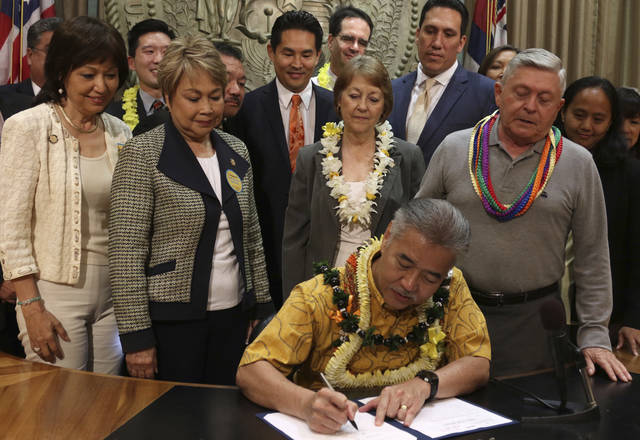HONOLULU — Hawaii became the latest state to legalize medically assisted suicide Thursday as the governor signed a measure into law allowing doctors to fulfill requests from terminally ill patients to prescribe life-ending medication.
“It is time for terminally ill, mentally competent Hawaii residents who are suffering to make their own end-of-life choices with dignity, grace and peace,” Gov. David Ige said.
Ige said the law was written to ensure the patient is in full control and it provides just one option available for end-of-life care, knowing assisted suicide is not for everyone.
“But we know that we have gotten to a point in our community that it does make sense to give the patient a choice to request the medication, obtain it and take it, or ultimately change their mind,” the governor said.
Hawaii’s heavily Democratic lawmakers approved the legislation late last month. The state joins California, Colorado, Oregon, Vermont, Washington state and the District of Columbia in allowing the practice.
Critics say they are concerned that the option will lead to hasty decisions, misdiagnoses and waning support for palliative care, in which dying people can be sedated to relieve suffering.
The law has safeguards to prevent abuse. Two health care providers are required to confirm a patient’s diagnosis, prognosis, ability to make decisions and that the request is voluntary.
A counselor also must determine that the patient isn’t suffering from conditions that may interfere with decision-making, such as a lack of treatment of depression.
The patient must make two oral requests for the life-ending medication, with a 20-day waiting period in between, and sign a written request witnessed by two people, one of whom can’t be a relative.
Criminal penalties will apply to anyone who tampers with a request or coerces a prescription for life-ending medication.
“The time was right for Hawaii to adopt this law,” said Peg Sandeen, executive director of the Death with Dignity National Center, a nonprofit advocacy group. “The safeguards Hawaii state legislators have enacted into this law will ensure that patients are in control of this process and make their own decisions at every step of the way — as is their right.”
Allowing medically assisted death has been a divisive issue in the state. Last year, a similar measure passed the state Senate but was later tabled in the House.







A sad, sad day for Hawaii…may God have mercy on the souls of these politicians endorsing euthanasia. Legality does not equal morality.
Superstition doesn’t result in morality either.
Believing human life is important enough not to kill is NOT superstition.
https://uploads.disquscdn.com/images/239d60dcd658a8f61c35e1a0201d56da75c807b436db8fa9052809240110468e.jpg
Many doctors have these.
There are times when it is inhumane to force a person to live.
Neither sad nor happy.
Relieving pain and suffering is compassion.
It’s not compassionate to put millions of mentally ill and disabled people at risk because their lives are not considered worth living.
A sad day for Hawaii. “the terminally ill are a class of persons who need protection from family, social, and economic pressures, and who are often particularly vulnerable to such pressures because of chronic pain, depression, and the effects of medication.” This is the argument that led the Alaska Supreme Court to rule against assisted suicide.
Great day for cutting healthcare costs!